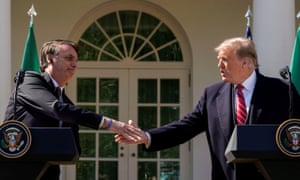Michael Lind’s new book argues that ‘technocratic neoliberalism’ cut itself off from white working-class heartlands and opened the door to rightwing populism

Photograph: Mark Makela/Reuters
Michael Lind, the author of The New Class War: Saving Democracy from the Managerial Elite, has a theory. Today’s political villain, he argues, is a phenomenon he calls “technocratic neoliberalism” – a geographically clustered, managerial or metropolitan, university-educated elite who have in large part won control of the US political, economic and cultural life.
The failure of this group to comprehend its upper hand over sparsely populated, white working-class heartlands, and the group’s subsequent refusal to compromise on differences of approach, is a failure that threatens democracy and creates a vacuum for populist demagogues like Donald Trump to fill, Lind argues.
Lind’s analysis is reminiscent of the one espoused by philosopher Richard Rorty, who in 1998’s Achieving Our Country predicted the working class would eventually be seduced into supporting a demagogic populist after being abandoned by the middle class.
“Within the contemporary elite, there is this idea that if you set out the facts, everyone will agree,” Lind says. “And if you agree on the facts, then there is only one correct side. But in my agonist view of politics, people don’t disagree on facts, but about how to fit them with their values.” The result is a standoff that has one side pitted against the other with no way to compromise.
“We need the ability to build consensus because it’s too destabilizing to have one half of the population trying to ride roughshod over the other,” Lind says. “But you can’t get there by appealing to facts.”
Until there’s a mutual acknowledgment of differing values, Lind argues, the dispute between left and right is unresolvable.
“You can only have compromise if you acknowledge the legitimacy of the prior conflict. If you claim that conflict is based on the ignorance of one side, or their insanity, or ignorance, then there’s no point in compromise; they should either be converted or defeated.”
The book’s arrival is exquisitely timed: midway through an impeachment trial that appears as unlikely as the Mueller report to hold Trump to account, and days before the start of primary contests to select a challenger who might be able to beat Trump. The success of that candidate could hinge on whether Trump is an aberration or symptomatic of failures on the left that Lind seeks to describe.
That Trump was able to win the US presidency, Lind says, is merely a symptom of a metropolitan class that is profoundly out of touch with traditional working-class voters. He argues that the rise of the populist demagogues – Trump, whom he describes as an “typical 80s New York Democrat with racial prejudices”; Brazil’s Jair Bolsonaro; Italy’s former deputy prime minister Matteo Salvini – represents a breakdown of value pluralism, the philosophical idea that opposing values may be equally correct or, in the words of Rorty, “there are no facts, only interpretations, and no interpretation is any closer to reality than any other”.
But, Lind warns, technocratic neoliberals (the said managerial class of culturally privileged voters) and demagogic populists like Trump are roads to the same autocratic destination.
“Demagogic populism is a symptom. Technocratic neoliberalism is the disease. Democratic pluralism is the cure,” he writes.

Since it was published last week, his analysisof how the Democratic-leaning base of America’s heartland was “effectively locked out of the decision-making” of the country’s political structures has been widely critiqued.
The New York Times argued that Lind presented “a highly distorted portrait of Trump supporters as victims” and suggested that Lind should break out of his institutional confines and go into the heartland to do some firsthand reporting of his own.
The criticism stung, but Lind says his goal “is to save the system from Trump and Farage” by tracing the failure of technocratic neoliberalism back to the dissolution of regional, social and political institutions that could respond to the needs of diverse groups.
“Institutions that used to magnify the power of working-class people – trades unions, local political parties and religious congregations – have all dissolved for different reasons. By default, power has siphoned upwards in the culture, politics and the economy,” he says.
Without grassroots organisations, he argues, politicians are unlikely to get the policies right. In the place of those channels, he points out, we have telephone polls that inform social science studies or, he says, “they send someone from New York or Washington to the mysterious primitive heartland, to Ohio or Indiana, and interview the natives. Then you go back and write like a missionary.”
In each case, he says, “you hear what you want to hear” and then get punished at the ballot box.
This patronising view extends to Hispanic voters, Lind claims, noting that 29% of them voted for Trump in 2016. “If those groups vote for Republicans, they’re accused of betrayal or of suffering from false consciousness.”
But the idea that Trump was put over the top by white nationalism is not what the vote totals show, Lind says, pointing to polling data that after 2010 shows that white progressives have moved far to the left of African and Latino Americans.
“This is really being driven by elite whites, not by members of minority groups necessarily. They pose as saviors and champions of victimized groups and take a highly melodramatic view of politics.”
Between an oligarchy in technocratic form and outsider populism, Lind predicts that oligarchs with money and connections will win nine times out of 10. But as they turn narrow and nepotistic, the ruling class will further lose their connection to reality.
His recommendation? Lind’s interpretation is that the right have lost on so many issues, from Roe v Wade to same-sex marriage, that the winner of the war is not seriously in question. “But there’s an intolerant streak on the left which worries me. I think it’s up to the left to offer an olive branch.”



